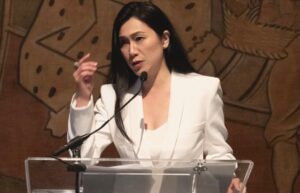Agnes Hsu-Tang

Adjunct Senior Research Scholar
Educational Background
BA: Bryn Mawr College
MA: University of Pennsylvania
PhD: University of Pennsylvania (’04)
Dr. Agnes Hsu-Tang is Board Chair of The New York Historical and Co-chair of the Objects Conservation Visiting Committee at the Metropolitan Museum of Art.
Trained as an archaeologist and art historian, Dr. Hsu-Tang served on UNESCO’s (Paris) scientific committees from 2006 to 2013, participated on missions to Uzbekistan, Turkmenistan and Xinjiang, and authored a white paper on the multi-national UNESCO inscriptions of the Qhapag Ñan (the Incan Road) and the Continental Silk Road (Chang’an to Tianshan Corridor). From 2013 to 2014, Agnes advised President Obama’s Cultural Property Advisory Committee on the renewal of a bilateral agreement to reduce the illicit trafficking of cultural objects. Agnes began her training in Classical languages in high school, and studied Classical art and archaeology and English literature at Bryn Mawr College. After college, Agnes served as a special assistant to the late U.S. Ambassador James R. Lilley, a former envoy to China and Korea. She also holds a M.A. in East Asian and Middle Eastern Studies from the University of Pennsylvania.
Agnes was a Mellon pre-doctoral fellow in History of Science at the Needham Research Institute at Cambridge University in 2003; she received her Ph.D. from the University of Pennsylvania in 2004. From 2004 to 2007, Dr. Hsu-Tang was an inaugural Joukowsky fellow in archaeology at Brown University; she was a Mellon scholar in Classics at Stanford University from 2007 to 2008. She joined Columbia University in 2015 and was appointed Distinguished Consulting Scholar at University of Pennsylvania’s Museum of Archaeology and Anthropology in 2018.
From 2008 to 2015, Dr. Hsu-Tang was involved in several international films on art and archaeology. She was the bi-lingual host and narrator of two award-winning documentary series: an archaeology series on History Channel Asia (2011-2013), and a contemporary art series on Discovery Channel Asia (2014-2015) that premiered during 2014 Art Basel Hong Kong. Her prior film credits include “The Giant Buddha at Leshan” (2009) and “Xi’an: China’s Forgotten City” (2010) on Discovery USA, “China’s Terracotta Warriors” on PBS (2011), and Mankind: The Story of All of Us series on History Channel (2012).
Dr. Hsu-Tang has been a director at the Institute of the Study of the Ancient World (ISAW) at New York University since 2013. She is a co-founder of the Tang Center for Early China at Columbia University (2015), Tang Center for Silk Road Studies at UC Berkeley (2018), and Hsu-Tang Library for Classical Chinese Literature at Oxford University Press (2021). She is a founding member of the Artist Protection Fund at the Institute of International Education (2014-2022), and served on the boards of the University of Pennsylvania’s Museum of Archaeology and Anthropology (2013-2018) and the Peabody Institute of Archaeology at Phillips Academy Andover (2015-2018). She chaired Asia Society’s Global Arts Council (2015-2020), and was Executive Chair of Asia Society’s inaugural Triennial of Contemporary Asian Art in 2020.
Dr. Hsu-Tang is a longtime trustee of The New York Historical, and formerly, a managing director on the board of the Metropolitan Opera from 2014 to 2021, at which she chaired its nominating committee from 2018 to 2020 and served on the oversight committee.
Formerly trained as a Classical musician, Agnes made her debut at the Kennedy Center for the Performing Arts in 1989. She is a recipient of two Mellon fellowships for her academic research, a teaching recognition from Brown University’s Department of History of Art and Architecture, and of the Institute of International Education’s (IIE) Centennial Medal and The Metropolitan Museum of Art’s Women Leaders Award for her work in cultural heritage.
Select Publications
“A Tomb with A View: Axonometry in Early Chinese Cartography” in Designing Boundaries: The Exercise of the Spatial Imagination in Pre-Modern China: Shaping the Expanse (Berlin: De Gruyter, 2022)
“Executive Chair’s Preface” and “Art of Virtue” in exhibition catalog We Do Not Dream Alone (Milan: Skira Editore SpA, 2021)
“Dreaming Together in a Divided World” in exhibition catalog Dreaming Together: New-York Historical Society and Asia Society (New York: New-York Historical Society, 2020)
“Structured Perceptions of Real and Imagined Landscapes in Early Imperial China” in Geography, Ethnography, and Perceptions of the World from Antiquity to the Renaissance (Oxford: Wiley-Blackwell, 2009)
“An Emic Perspective of the Ancient Mapmaker’s Art” in Journal of the Royal Asiatic Society (Cambridge: Cambridge University Press, 2007)
White paper: The Exceptional Universal Value of the Road Systems in Ancient Empires: A Comparative Study of the Chinese Oasis Route of the Early Silk Road and the Qhapag Ñan (Paris: UNESCO, 2006)
 Madeleine Zelin
Madeleine Zelin Gray Tuttle
Gray Tuttle
